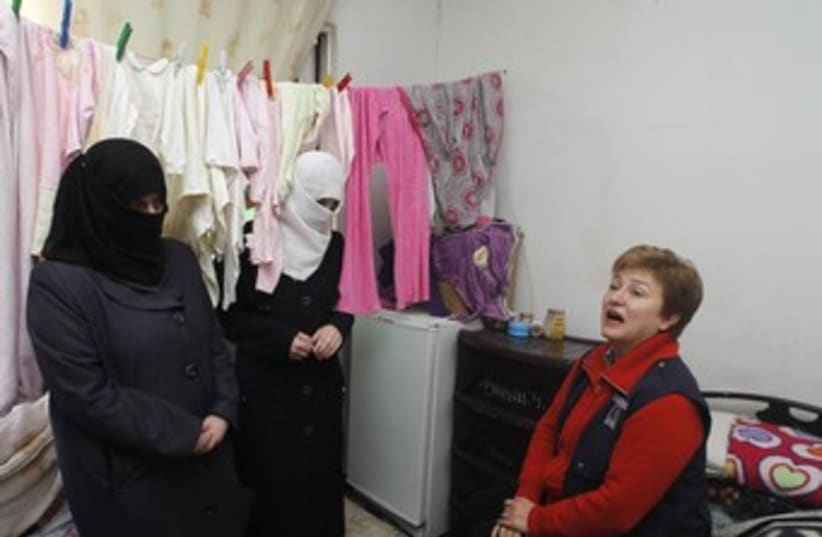ZATAARIREFUGEE CAMP Abu Ahmed arrived in this refugee camp just over the Jordanianborder after walking over 50 miles. He is haggard after two sleepless nights, andsuffering chest pain for a wound he received while fighting with the Syrianrebels against Syrian President Bashar Assad.
"Icame close to dying twice,” he whispers to The Media Line, clearly almostout of strength. “The first time was during a battle when the army ambushed usin farmland in Etseel (west Deraa). The second time was when the army bombedthe field hospital where I was receiving treatment."
The34 year old former schoolteacher is one of dozens, perhaps hundreds, of injuredSyrians who came to Jordanseeking treatment from wounds sustained in fighting in the border town of Deraa. Like mostrefugees, he asked to use only his first name, fearing for relatives still in Syria.
Had Abu Ahmed not made the risky trip across the border with Jordan, he believes he would havebled to death.
"Youcould die from a simple wound. Field hospitals are difficult to access andmedical supplies are rare," he told the Media Line while lying on acot at a clinic in Zataari camp, where there are already 40,000 Syrian refugees.After his wound was dressed, the short, husky man left the clinic and went tohis tent for some much-needed sleep.Hesaid that the field hospital in Syriawhere he was first treated was set up in an orchard, protected by branches and hiddenunder a tree.
AbuAhmed is among the lucky ones to be treated by a veterinarian, joked an injuredcivilian.
"Somepeople were treated by midwives, medical students or even people without anytraining," Abu Yasmin told The Media Line. "It is no longer safe toset up field clinics in homes. The fighters are erecting field hospitals indungeons, caves underground or in orchards.”
Activistssaid larger numbers of refugees have been crossing to Jordan thanever, amid fears of an exodus of entire towns as the level of violenceskyrockets.
Ina single night last week, at least 20 civilians and rebels crossed from thenorth western border of Deraa near Yarmouk Rive to Ramtha, including women andchildren, said medical sources.
Activistssaid the Syrian army has recently intensified its shelling on a number of towns in thesouthern province, including Etseel, Hafna, Heit, Abdeen and Shajara on thewestern edge of Deraa, near the border with Jordan.
Crossinginto Jordanis a risky business as Syrian troops often open fire on refugees.
Duringthe past two months, several refugees were reported killed near the border bySyrian troops.
Meanwhile,Jordanhas adopted an open border policy to accommodate the increasing number ofrefugees. A Jordanian military source said the army often shoots back at Syriantroops to provide cover for Syrian refugees who want to enter Jordan. He admitted their efforts donot always work.
"Inone month, at least four refugees were killed while trying to cross, includingone child," the source told the Media Line.
Governmentspokesman Sameeh Mayta said authorities in Amman will continue carrying out theirhumanitarian duty to receive and protect refugees, but warned that thecash-strapped kingdom needs international aid. Mayta pointed to continuousefforts with the major international bodies to improve service to refugees.Thereare today an estimated 150,000 Syrian refugees in Jordan, about 38,000 in Zaatari refugeecamp. Jordanian officials say they are planning to open a new refugee camp in Zarqato accommodate more refugees who are expected to flee to the kingdom as the warrages non-stop.
Recentarrivals say they bring little with them, except their said stories.
Rami Hassan, 45-year-oldfarmer from Deraa city, said dozens of families were left stranded duringshelling and vulnerable to indiscriminate army raids.
"Anyman in Deraa is subject to being arrested, or even killed, on the spot. TheSyrian army is going mad, thinking all civilians carry guns to shoot atthem," said Hassan,who arrived in Jordanwith his injured young sister last month.
Hassan said he carried hissister on his shoulders for 10 hours to take her across the border.
"Shewas injured in her leg and we put cloths as bandages to stop the bleeding, buthad she not received treatment, her leg would have been amputated," Hassantold the Media Line. "Horror is everywhere. People do not know where torun anymore. There is shelling everywhere.”
